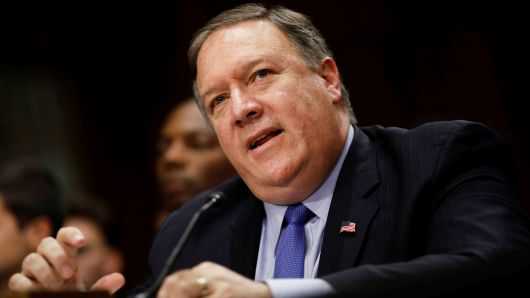Pompeo spotlights Pakistan as latest tension point between Washington and Beijing
01 August, 2018

Secretary of State Mike Pompeo testifies before the Senate Foreign Relations Committee on Capitol Hill in Washington, July 25, 2018.
U.S. Secretary of State Mike Pompeo has issued some warning words over Chinese involvement in Pakistan, shedding light on what could be another growing point of contention between the world's two largest economies.
In an exclusive interview with CNBC on Monday, Pompeo criticized the idea of an International Monetary Fund (IMF) bailout for Pakistan, whose economy is on the brink of crisis. The remarks were specifically pointing to China and how it would benefit from such a deal.
"Make no mistake, we will be watching what the IMF does," the diplomat said, in response to reports that Pakistan is planning to request a bailout package of up to $12 billion to shore up its depleted currency reserves and indebted economy.
"There's no rationale for IMF tax dollars — and associated with that, American dollars that are part of the IMF funding — for those to go to bail out Chinese bondholders or China itself."
Washington has voiced its disapproval of growing Chinese involvement in Pakistan and other developing countries, accusing the world's second-largest economy of overwhelming smaller countries with loans and being part of the problem rather than the solution.
China-Pakistan Economic Corridor
But Beijing's engagement with the South Asian nation has only been increasing. Pakistan's significant uptick in inward foreign direct investment (FDI) in the last year is largely thanks to the $62 billion China-Pakistan Economic Corridor (CPEC), a series of joint projects in energy production and infrastructure including railroads, roads, ports and power plants. CPEC is part of China's broader One Belt One Road (OBOR) infrastructure push across much of Asia, the Middle East and Africa.
"The U.S. is stepping up the ante against China and its One Belt One Road project," said Timothy Ash, senior emerging markets strategist at Bluebay Asset Management, arguing that the U.S. point "is a fair one."
This, he said, is because China extends loans to emerging market countries around the world for difficult-to-finance projects in areas like infrastructure and energy. While this offers a crucial leg-up in terms of development, the costs are often high, "including unfettered market access which can destroy local industries and perversely the ability to pay back."
Pakistan elections: What happens with CPEC? 1:45 AM ET Fri, 27 July 2018 | 02:50
It also creates immediate-term economic imbalances like wider current account deficits, higher debt, weaker currencies and foreign currency reserve depletion, which is exactly what Pakistan is seeing today.
"I think with the Pakistan bailout now in sharp focus, and with the U.S. looking to counter rising Chinese influence globally, this story will run, and run," Ash said.
Investor worries
Faced with an impending crisis, Pakistan's newly-elected government, led by former cricket champion Imran Khan, is likely to request an IMF bailout, although the IMF says it has not yet received any requests.
"Pakistan needs a sizable injection of capital. Foreign exchange reserves are simply too low. And that means the IMF," said Hasnain Malik, global head of equity research and strategy at frontier investment bank Exotix Capital.
Now some investors are worried that the U.S. stance could prevent a potential bailout from being approved.
This is also due to the deterioration of U.S.-Pakistani relations, according to Christopher Dielmann, senior economist at Exotix Capital. Relations between the countries, strategic partners in the "war on terror," have grown increasingly fraught amid criticism and funding cuts from Washington over what it says is Islamabad's refusal to adequately counter extremist groups in and around the country.
In response to a vocal rebuke from Trump on the issue in January, China quickly came to Pakistan's rescue, its foreign minister praising "the outstanding contribution to the global cause of counter terrorism."
On U.S. opposition to a deal, Dielmann said, "I think it is something that the Fund will look at very closely but, at the end of the day, likely will not impact Pakistan's ability to receive an IMF package." Washington could attempt to sway the lender through backdoor lobbying efforts, he added, "but ultimately this is unlikely to prevent a program."
China versus the IMF
But when the IMF is called on, the Chinese still expect their debts to be paid out first.
In order for the IMF to approve a bailout, "they will need to be seen as a preferred creditor, effectively preventing repayment to other creditors in advance of the IMF," Dielmann said.
"That it is certainly something that the Fund will consider very closely in regards to the amount being disbursed, the timing of the disbursements — especially in regards to repayments falling due to other creditors."
Pakistani cricketer turned politician Imran Khan of the Pakistan Tehreek-e-Insaf (Movement for Justice), speaks to supporters during a campaign rally ahead of the general election in Karachi on July 22, 2018.
But China can co-exist with the IMF, Malik said, citing previous examples in Sri Lanka and Kenya. However, the international lender would require more commitments to structural reforms like addressing rampant corruption and trimming state enterprises — issues that China generally lets slide.
Whether these structural problems can be addressed will be among the biggest challenges for the incoming government, whose victory was marred by violence, repression and allegations of vote-rigging, harassment and bribery. Observers say that the newly-elected Khan was heavily supported by Pakistan's all-powerful military establishment, tarnishing his credibility in the eyes of his opponents.
Whether Khan can deliver on his pledge to tackle corruption and infighting may be more under the control of the military than he would like to admit.
"The stronger the next civilian government, the more credible its commitment in this regard," Malik said.
TAG(s):
